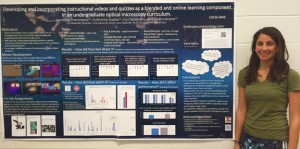BOLD Fellow presents at the American Geophysical Union Fall Meeting
By Dani Picard, CFT Graduate Teaching Fellow
 Samantha Tramontano, a graduate student in Earth & Environmental Science and CFT BOLD Fellow, presentedher research on online instructional materials at the 2015 American Geophysical Union Fall Meeting, which took place in San Francisco in December.
Samantha Tramontano, a graduate student in Earth & Environmental Science and CFT BOLD Fellow, presentedher research on online instructional materials at the 2015 American Geophysical Union Fall Meeting, which took place in San Francisco in December.
Samantha developed videos and online quizzes to help undergraduate geology students develop microscopy skills, a necessary skill that allows students to describe and distinguish Earth materials in the Earth Materials class in which the module was implemented.
According to Samantha, “Visual and spatial reasoning and understanding are important skills for many disciplines within the Earth Sciences, and developing those skills is one of the major challenges students face when they are first learning how to use microscopy as a tool for understanding optical mineralogy. Students struggle with building basic microscopy skills that are essential for their progression as Earth scientists.”
The videos show students what they should be looking for when examining minerals and demonstrate the observation protocols and spatial skills they will need to use. The videos are accompanied by low-stakes quizzes to allow students to assess their own understanding. Samantha found that these videos enabled students to be more self-sufficient in lab and enhanced their confidence and engagement.
Samantha developed this project with her faculty mentors, Dr. Guil Gualda and Dr. Lily Claiborne, through the BOLD program at the Vanderbilt Center for Teaching. She explains, “I was initially drawn to the BOLD program because it allowed me to explore creative ways to teach my favorite subject. Mineral studies labs tend to get a bad reputation for being difficult, and it was great to be part of an effort to make this subject more accessible and enjoyable! I also really like tinkering and making movies – I had done it in the past and was excited at the prospect of nudging a traditional geology subject into the future.”
The project has some surprises for Samantha. “The videos I created were used by students at Vanderbilt University and at Illinois State University. It was fascinating to see how differently the populations used the videos. Vanderbilt University students would consistently return to re-watch videos, but they would only watch ~65% of the total video. The Illinois State students would return less frequently to the videos, but they would be watching ~95% of the total video. Feedback was positive from both institutions, and it was cool to see that students are benefiting from watching these videos regardless of how they watched them.”
Working with the BOLD program had important pedagogical effects on Samantha, including her thinking about interactivity in the classroom and the importance of student self-confidence. “This project has definitely made me more aware of how important it is for undergraduate students to have stimulating resources. There is a noticeable difference in the amount of attention that was required from me in lab between the year with the videos and the year without the videos. It is great to see that the videos have enabled students to be more confident and self-sufficient in lab and I can see myself implementing similar resources in any future teaching opportunities.”
Samantha adds that the most rewarding part of the conference was the feedback she received. “The feedback at the conference was really eye-opening. I had a number of people come up to me who were unfamiliar with the content but really interested in the implementation of the blended portion of the course. The people visiting came from a huge variety of institutions – a teacher from a private company in Australia, professors from an entirely online program, and professors teaching similar subjects. It was super cool!”
Check out more information on the project on her BOLD gallery page

Leave a Response